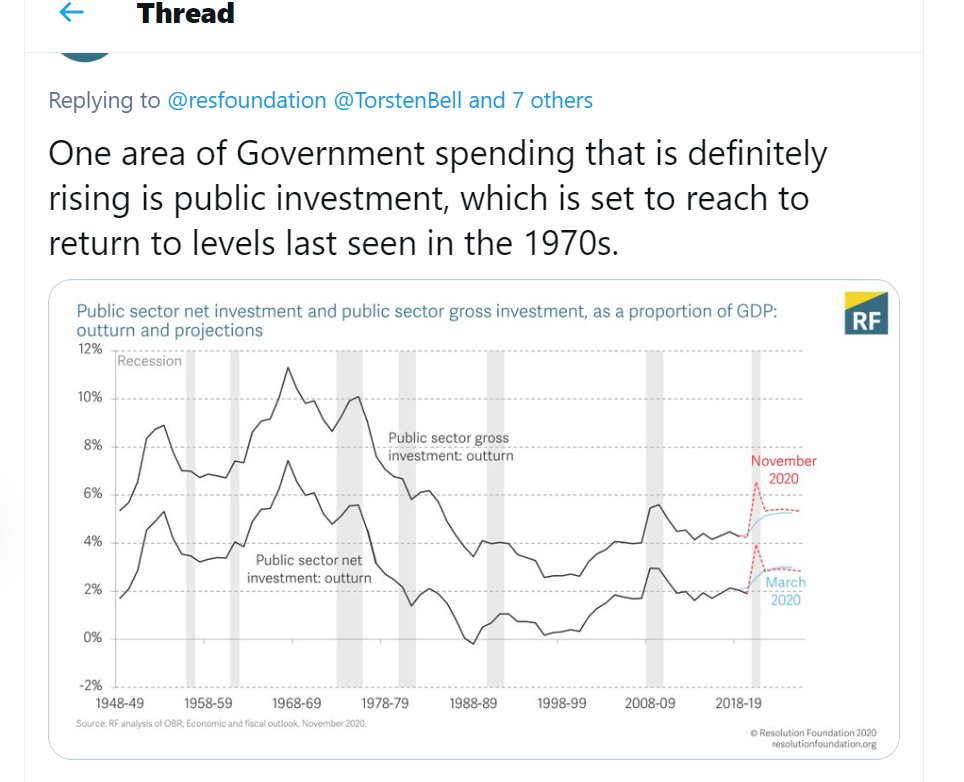Spending Review 2020 - the fine print on urban transport
The headlines...
- The focus remains on capital investment
- Overall (non-COVID19) spending projections for the next five years are below the Chancellor's pre-pandemic plans
- Non-COVID spending is well below pre-austerity levels for not protected Departments including transport and local government
- Things will probably get worse for non-protected departments (including Transport and MHCLG)
Here's some Resolution Foundation analysis...
‘While headlines have focused on cuts to the aid budget, in practice this will mean austerity feels alive and well for many departments at the time of the next election. Unprotected departments will remain almost a quarter smaller in 2024-25 compared 2009-10, with the Department for Transport still down by 45 per cent.’
Torsten Bell in the Times 26/11/20
Zero COVID19 revenue support funding for local transport for 21/22
Here's the scary table from the Spending Review...
Gulp...there is a COVID19 revenue allocation for national rail for 21/22...but not for bus and tram outside London or for TfL. Given the virus itself is unlikely to be vanquished entirely by April 1st 2021 (never mind patronage fully restored) this would be a disaster for local public transport networks and those who rely on them. And that's putting aside the way in which national rail is prioritised above any other form of public transport. It may be this is HMT's starting point for a negotiation but its not helpful or realistic either way. One way HMT may be planning to square the circle can be found elsewhere in the spending review where it announces its intention to eat into the £3bn extra funding which had specifically been earmarked for improving bus services over the next three years.
‘£300 million in 2021-22 to drive transformation of bus services. This funding will be drawn down in the first instance for any further Covid-19 support that may be required, while progressing reform to deliver better outcome’
More widely national rail and road (as well as charging infrastructure) gets a multi-year settlement but local transport does not. As part of this the zombie national road programme also continues unimpeded as 1970s road schemes are reanimated. In the process generating one thing that the UK isn't short of (car dependent sprawl) whilst funneling ever greater amounts of traffic into urban areas (where the Government has said it wants road space reallocated to active travel and buses).
Local Government funding - enough to muddle through for 21/22?
Although the longer term prospects don't look good - with some hefty council tax rises, then maybe. Here's what the LGA had to say: https://www.local.gov.uk/lga-responds-spending-review
New funds for urban transport?
There are a range of new funds for transport authorities to take a shot at. These include the £4bn levelling up fund which the Spending Review summarises thus: 'this new cross-departmental Fund for England will invest in a broad range of high value local projects up to £20 million, or more by exception, including bypasses and other local road schemes, bus lanes, railway station upgrades, regenerating eyesores, upgrading town centres and community infrastructure, and local arts and culture. SR20 makes available up to £600m in 2021-22.’
There's some good analysis on this in the Times.
MP support will be a factor in winning bids under this funding stream - which echoes the stress on MP involvement in the most recent tranche of active travel funding.
There's also a new fund for the largest city regions where
'Eight City regions will also benefit from £4.2 billion government investment in five year funding settlements for local transport starting in 2022-23, and £50 million in 21/22 to support preparations for settlements. Following the approach that has worked for London, these settlements will be agreed with elected Mayors and published, providing transparency and accountability while giving Mayors the flexibility and certainty to deliver their plans. The city regions that will receive settlements, subject to appropriate governance, include Greater Manchester, Liverpool City Region, West Midlands, West Yorkshire, Sheffield City Region, Tyne and Wear, West of England and Tees Valley. This will deliver the NIC’s recommendation to provide settlements that enable long-term and locally-led investment in large cities transport networks, devolving decisions on local transport to those that understand those systems best.’
There's also news on the replacement for EU structural funds - the UK Shared Prosperity Fund. £220m will be provided for the pilot programmes and new approaches, and further details of this funding will be set out in the new year. Part of the funding project will be about investment in communities and place, “including cultural and sporting facilities, civic, green and rural infrastructure, community-owned assets, neighbourhood and housing improvements, town centre and transport improvements and digital connectivity”investment for local business, which includes support for “innovation, green and tech adoption, tailored to local needs”.
Further details of the UKSPF will be set out in a “UK-wide investment framework” which is due to be published in the spring.
Key initial takeaways
- There are some hard yards ahead on securing sufficient revenue support to keep local public transport going during the pandemic and to get public transport back on its feet afterwards. Never mind it being in a fit state for the expansion needed for it to play its full part in meeting the wider decarbonisation challenge.
- Despite its inherent inefficiencies competition funding remains the Government's preferred format - although the longer term £4.2bn allocation for eight city regions looks like a better compromise.
- The stress on pump priming the electrification of vehicle fleets is welcome but an inadequate counterweight to a climate deaf national roads programme which eats up vast amounts of DfT spend which could be so much more gainfully employed.
- Local transport remains the poor relation to national transport not least in the hand to mouth funding arrangements compared with the multi-year settlements for national rail and road.




